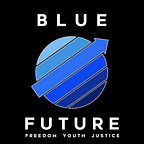Advice from one Socially Anxious Progressive to Another
By Sarah Green, Blue Future Fall and Winter Progress and Change organizer
Blue Future has not only connected me with opportunities to get involved in crucial elections this past year, but it has also fostered a community of like-minded young people committed to progressive causes. Our cohort of organizers attends weekly training sessions on Zoom, not only to discuss current events and political races but also to commiserate on what it’s like navigating this weird, virtual landscape during this weird, painful year. I’m very thankful for this community because it also acts as a support group.
Organizing is stressful work, and for people like me who have social anxiety, it can be downright nerve-wracking. Since I’ve spent the past few years volunteering on various campaigns, I’ve learned how to cope with the nerves as best I can. However, I’ve heard from many progressives that they are reluctant to phonebank because it sounds anxiety-inducing. I hope that by sharing some advice that has helped me over the years, I can encourage someone else to start organizing. So, here it goes! My advice for potential organizers who experience social anxiety:
- Rehearse the script — No matter if you’re knocking on doors or making calls, you’ll have a script to read from. The script will have phrases that you can say for the most common scenarios you’ll encounter when talking to a voter. You’ll also have general information about the candidate and their positions at hand, so you’re never going in completely cold. Still, it’s important to read over the script a few times before you start reaching out to voters. I promise the more exposure you have to the script, the more comfortable you’ll feel.
- Have an incentive at hand — During GOTV season in Fall 2020, Blue Future hosted a fun multiplayer bingo competition over Zoom during a long phone banking session. It inspired me to create my own 4x4 bingo board to make phone banking on my own more bearable. My bingo spaces read “someone hangs up as I’m talking,” “wrong number,” and other typical phone banking scenarios. Once I finish the entire board, I will treat myself to a large vanilla iced coffee with oat milk. Honestly, this incentive has made phone banking so much more fun and less stressful for me.
- Breathe — No, really. Remember to breathe. Sometimes, when people are nervous, they forget to breathe. This doesn’t work out too well when you’re speaking to people. Pencil reminders into your script where you can take a breath. Remember you can breathe when the other person is talking, too.
- Knock on doors! — I totally get how this seems like the most intimidating thing ever. Meeting strangers in person at their home to ask them for their support is way outside of many of our comfort zones. However, this is an activity I’ve come to really enjoy. Personally, I think canvassing is a little less scary than phone banking since you can read people’s facial expressions and body language. Plus, you’re often able to canvass with another person, so it’s not just you speaking. (Disclaimer: if you’re doing this during the pandemic, please wear PPE.)
- Text bank. — Texting is a great way to reach out to voters since people are always checking their messages. It’s also a fantastic way to get your feet wet in political volunteering. Obviously, you’re not actually speaking to anyone. You’re simply clicking buttons and waiting for responses. In my experience, however, texting feels a little less personal than a phone call or a door knock. This may not seem like a huge deal, but there’s nothing like a meaningful conversation with a voter when you can hear their tone and really empathize with them. Text banking is great in many ways, but you should be careful to not use it as a crutch. Door knocking and phone banking are still the most effective ways of gaining support, so don’t sleep on those options!
Hopefully, this advice bolsters someone who experiences social anxiety. This is for those of us out there who want to see progressive change in the country but may need a little more support getting started. I promise you can do it! We’re here for you.
…
About Sarah Green: Sarah is a recent graduate who has spent the past four years immersed in studying American history and public health. She has organized with Blue Future since June and has worked on Democratic political campaigns since 2016.
